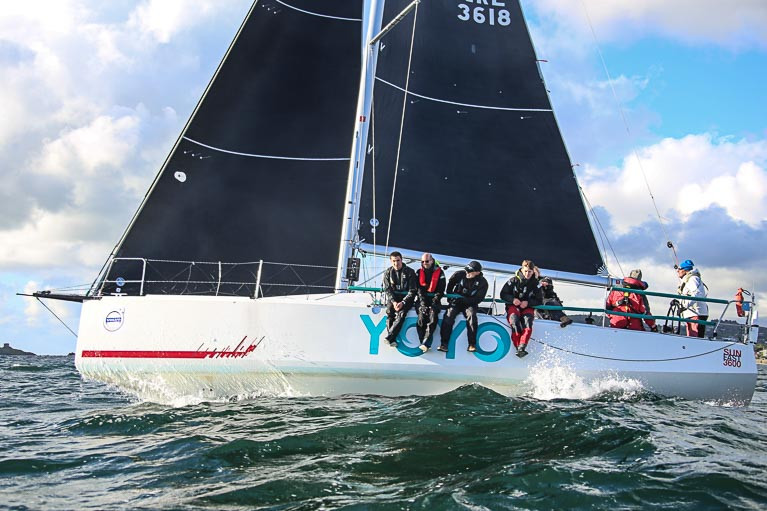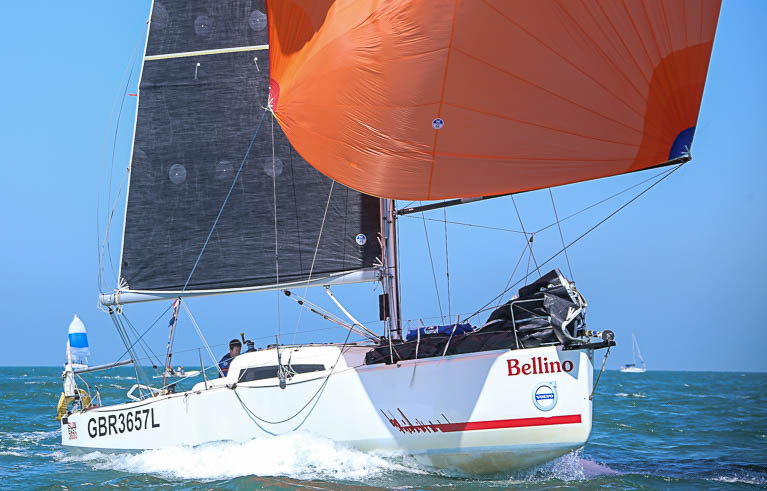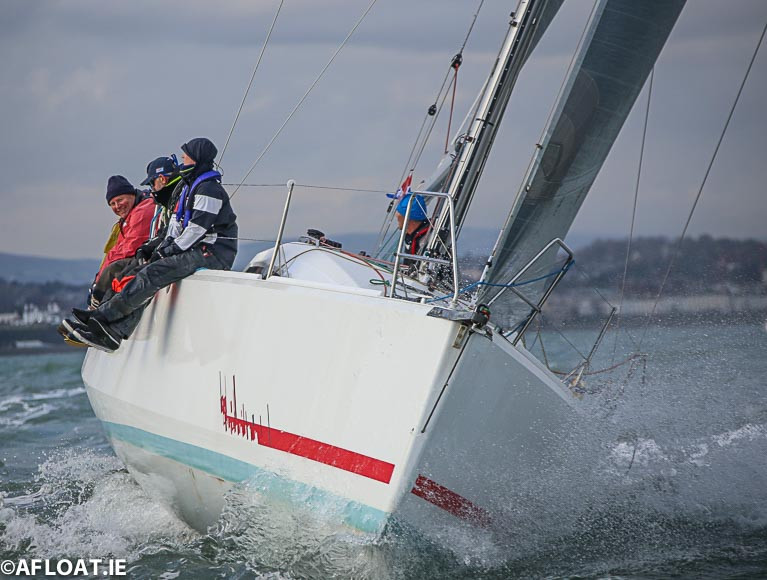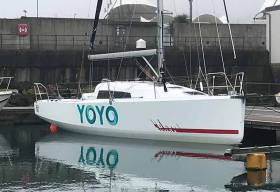Displaying items by tag: Sunfast 3600
National Yacht Club Sunfast 3600s Enjoy Early Double-Handed Training Session on Dublin Bay
Wednesday morning saw some early 2022 season double-handed two boat tuning for a pair of Jeanneau Sunfast 3600 keelboats on Dublin Bay.
ISORA campaigners Searcher (Pete Smyth) and John O'Gorman's Hot Cookie enjoyed 10-15 knots north-westerlies for a fast reach from Dun Laoghaire Harbour.
Searcher and Hot Cookie, both from the National Yacht Club, cut quite a dash crossing a deserted bay at speed under pink and red spinnakers.
The pair returned to the harbour after a two-hour session with Searcher sporting a ripped kite in conditions that had strengthened to over 20 knots in gusts.
ISORA celebrates its Golden Jubilee with a return to traditional Irish Offshore Racing in 2022 with the first fixture on May 28th with a 60-mile race from Dun Laoghaire to Holyhead. All this, of course, is preceded by DBSC's Spring Chicken Series that begins on February 6th.
Royal St. George Yacht Club's 'YoYo' Makes it Six Sunfast 3600s for Round Ireland Race
A sixth Jeanneau Sunfast 3600, and the second Irish one, is entered for August's Round Ireland Yacht Race as Dun Laoghaire Harbour's Yoyo (Brendan Coghlan from the Royal St George Yacht Club) takes on the 700-mile challenge too.
As regular Afloat readers will know, the Sunfast 3600 is proving a popular marque for this year's 21st edition of the race, both in double-handed and fully crewed set-ups.
Four Hamble based 3600s are registered now with, as Afloat reported in May, Gavin Howe's Tigris, Donal Ryan's Team Fujitsu, Deb Fish's regular Bellino as well as Black Sheep (T Middleton) all slated for the Wicklow Head start.
They'll be joined by local John O'Gorman's Hot Cookie. The National Yacht Club Sunfast 3600 took third overall on IRC in last year's Dun Laoghaire Dingle Race, so the offshore hardened crew will be a force to be reckoned with in August.
Five Jeanneau Sunfast 3600s Now Racing Round Ireland
Yet Another British-based Jeanneau Sunfast 3600 has entered August's SSE Renewables Round Ireland Race bringing to five the number of the hard chined pocket-rockets entered for Ireland's biennial 700-mile offshore race.
Gavin Howe's Tigris latest entry – the 44th boat into the Irish race – is a potent addition too. Howe, of the Royal Ocean Racing Club, is a former Round Britain Race competitor. A regular two-handed entry, for which the 3600 is popular for, Howe finished fourth overall in the two-handed class in last year's RORC Points Series.
Well adapted to solo, doublehanded, and crewed regattas, the Sun Fast 3600 is proving a popular marque for the August 22nd race. Four Hamble based 3600s are registered now with, as Afloat reported in May, Donal Ryan's Team Fujitsu, Deb Fish's regular Bellino as well as Black Sheep (T Middleton) all slated for the Wicklow Head start.
They'll be joined by local John O'Gorman's Hot Cookie. The National Yacht Club Sunfast 3600 took third overall on IRC in last year's Dun Laoghaire Dingle Race, so the offshore hardened crew will be a force to be reckoned with in August. AS previously suggested, although not Round Ireland registered so far, there is always the prospect of Dun Laoghaire Harbour sistership Yoyo (Brendan Coghlan from the Royal St George Yacht Club) taking on the challenge too?
If the prospect of a fleet of four Sunfast 3600s for this summer's Round Ireland Yacht Race is not enough of a sign of Jeanneau's potency offshore these days, the race debut of at least two brand new Sunfast 3300s is also another exciting aspect of the postponed 700-mile race that looks set to attract an international fleet for its 21st edition.
As regular Afloat readers will know, the recently arrived Kinsale-based 3300 supplied by MGM Boats 'Cinnamon Girl' is signed up and, as Afloat sources now reveal, this West Cork entry brings with it the prospect of a UK sistership entering the race too.
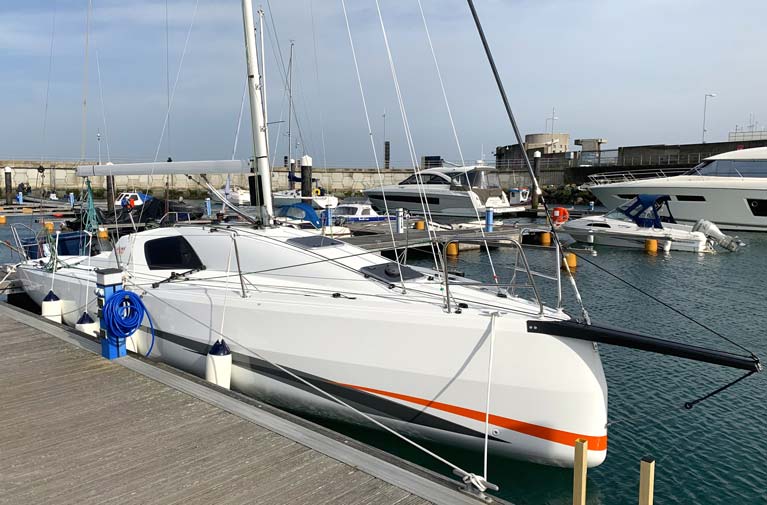 The new-style stem on the MGM Boats-imported Sun Fast 3300 Cinnamon Girl as seen in March in Dun Laoghaire. Photo: Afloat
The new-style stem on the MGM Boats-imported Sun Fast 3300 Cinnamon Girl as seen in March in Dun Laoghaire. Photo: Afloat
As Afloat's WM remarked in March, weeks before lockdown, the launch of the 3300 will make Irish sailing fun again, let's hope he is right!
Sunfast 3600
Three Hamble based 3600s are registered now for the August 22nd start with Donal Ryan's Team Fujitsu, Deb Fish's regular Bellino as well as Black Sheep (T Middleton) all slated for the Wicklow Head start.
They'll be joined by local John O'Gorman's Hot Cookie. The National Yacht Club Sunfast 3600 took third overall on IRC in last year's Dun Laoghaire Dingle Race, so the offshore hardened crew will be a force to be reckoned with in August. Although not Round Ireland registered so far, there is always the prospect of Dun Laoghaire Harbour sistership Yoyo (Brendan Coghlan from the Royal St George Yacht Club) taking on the challenge too?
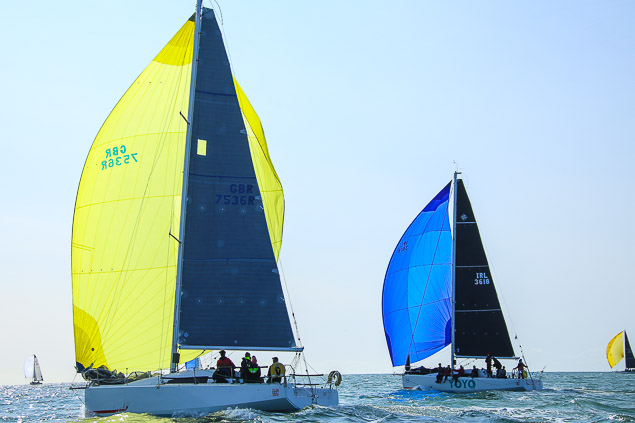 Two Dun Laoghaire Harbour Sunfast 3600s – Hot Cookie Sunfast 3600 (John O'Gorman) to weather and Brendan Coghlan's YOYO (also below) from the Royal St George Yacht Club competing in a 2019 ISORA race Photo: Afloat.ie
Two Dun Laoghaire Harbour Sunfast 3600s – Hot Cookie Sunfast 3600 (John O'Gorman) to weather and Brendan Coghlan's YOYO (also below) from the Royal St George Yacht Club competing in a 2019 ISORA race Photo: Afloat.ie
Sunfast 37
Meanwhile, three older Sunfast 37s are also flying the Jeanneau flag in this 21st edition of the race. John Conlon's Sun Fast 37, Humdinger from Arklow Sailing Club is registered as are two Irish Offshore Sailing School entries from Dun Laoghaire Harbour too.
New Jeanneau Sunfast 3600 'Yoyo' Debuts at Dun Laoghaire Marina
The ISORA fleet's newest arrival, a brand new Jeanneau Sunfast 3600 named Yoyo, made its debut at Dun Laoghaire Marina this weekend and although only partially commissioned by MGM Boats at this point, the Daniel Andrieu design looks more than ready for the first race of the ISORA calendar next month.
As Afloat.ie readers will recall, the twin rudder yacht arrived into Dun Laoghaire Harbour last month and is a sistership to the hugely successful BAM! from Howth Yacht Club.
Adapted to solo, doublehanded, and crewed regattas, the Sun Fast 3600 is designed to compete in both inshore and offshore races.
The first ISORA race of the season is a 40–mile coastal shake–down on April 21st.
Yoyo is berthed at the end at the entrance to Dun Laoghaire marina and she's well worth a look. The starting price for such a boat is €172,000 including VAT but excluding sails and delivery charges. Temptingly, an MGM Boats notice displayed on a stanchion says 'two more available for this season'....
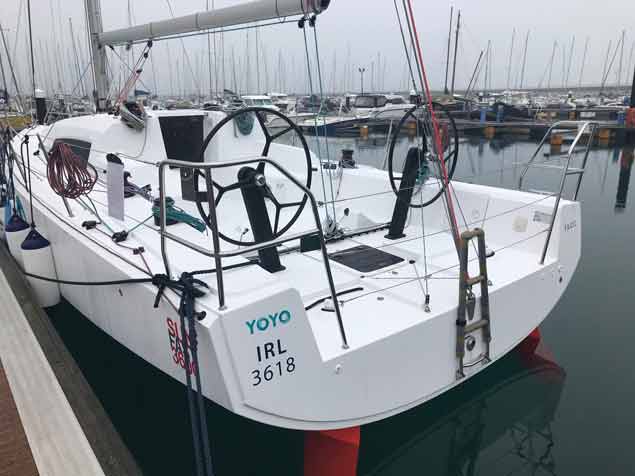 YoYo is set up with a twin wheel configuration. Available with twin, composite tillers or wheel steering and choices in mainsheet management, the SF3600 deck layout ensures easy handling through well thought-out ergonomics and optimised sailing functions
YoYo is set up with a twin wheel configuration. Available with twin, composite tillers or wheel steering and choices in mainsheet management, the SF3600 deck layout ensures easy handling through well thought-out ergonomics and optimised sailing functions


























